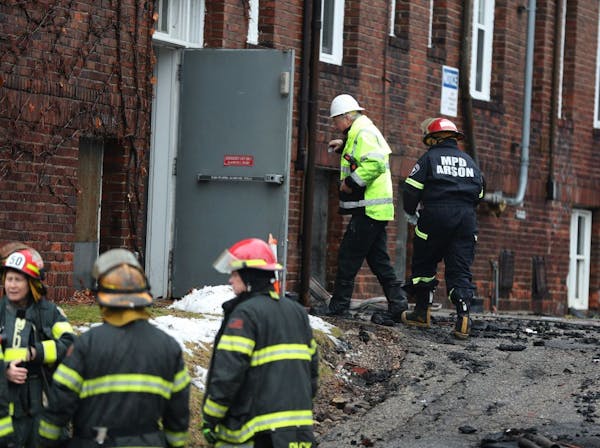On the last leg of a 24-hour shift, right as Abdul Cunningham climbed into bed, a call came in over the radio in downtown Minneapolis' Station 1 firehouse.
It was Christmas morning, just before 3 o'clock. Cunningham, a captain in the Minneapolis Fire Department, guessed it was a false alarm. He could be back in bed in no time.
But as Cunningham and Engine One pulled up to the block of the Francis Drake Hotel, he realized it was much worse than the call had described.
"I saw all the smoke come out of the side of the building," he said. "Mentally, I had to take a breath and calm myself down."
Take it easy, Cunningham told himself. One step at a time.
Then he and his crew jumped off the rig, grabbed their gear and ran to the front door.
One day later, investigators were working to determine the cause of the fire that engulfed the Drake Hotel and displaced about 200 people, many of them children and homeless. The city has partly condemned the burned building.
Many say the outcome could have been much worse if not for a swift response by fire crews that night.
"There were no serious injuries and, thankfully, due to the wonderful work of our firefighters and our fire department, they're all safe," said Mayor Jacob Frey. "That in and of itself is something that we should take solace in."
For those on scene, it was a 32-hour battle. The firefighters worked in shifts and took turns changing out oxygen and chugging water before returning to a blinding billow of smoke, in what Cunningham calls one of the hottest fires he's fought in 18 years on the job.
"It takes a big toll on us personally at times," said Assistant Fire Chief Bryan Tyner, speaking outside the smoldering building late Thursday morning. "I'm sure everybody that responded to it will probably remember it for the rest of their lives."
'It was pitch black'
When Engine One pulled up to the scene moments after the dispatch, the fire was burning on two floors — already more severe than they'd heard over the radio. Flames came out the windows, climbing to the next floor.
A man ran down the stairs. "She was right behind me!" he screamed. "She was right behind me!"
Firefighter Dan Bellis found the woman inside an apartment — conscious, upright but addled by smoke inhalation.
"She was trying to run away from me," said Bellis. "I had to grab her and get her out to the stairwell."
Around this time, Ladder 11, the search-and-rescue team, pulled up from the other side of the Drake. The crew ran up to the second floor, helping people out of the building. Most of the tenants were disoriented from the smoke; one was walking into the fire when they stopped her.
"It was pitch black," said firefighter Mike Meininger, who was on Ladder 11. He turned a corner and the smoke disappeared. "It was just a wall of fire."
The flames were so high they had to drop to their knees. When Meininger's team met up with Cunningham and Bellis, they were able to break a window and hook up the first hose to water.
"All you could see was red glow as [Bellis] shot the water," said Cunningham.
It seemed like 30 minutes, but it might have been only five, or less, from the time they arrived to when they turned on the hoses.
"It felt like time stopped," Cunningham said.
Flames spread
Many of the first on scene were accustomed to working fires together. They each acted out their roles wordlessly.
"I know what he's going to do, he knows what I'm going to do," Cunningham said. "We know our strengths, our weaknesses ... I think in chaos it was pretty organized."
At the beginning, they took breaks every 30 to 45 minutes — only enough to switch out oxygen, then came back immediately. The flames spread to the third floor, and they spent the next few hours trying to contain a nearly 100-year-old timber structure.
Just a month earlier, Bellis, who has been with the department a year and a half, helped fight a fire at another old building, a public housing high-rise in Cedar-Riverside. The fire killed five people.
This time, with all the fire and smoke, he was surprised that everyone got out alive.
"I was thinking we were going to get a lot more casualties," Bellis said.
They brought the fire under control by the time their shifts ended and others were arriving to take their places. It was 8 a.m.
Cunningham was too amped to sleep. "I'm replaying it in my head, thinking, 'I could have done this different, I think that went well.' "
He went home and took a long, hot shower, then he cleaned up around the house. It was Christmas, and he had family coming over.
Staff writer Liz Navratil contributed to this report.
Andy Mannix • 612-673-4036

Want to share info with the Star Tribune? How to do it securely

'Safe recovery sites' would offer syringes, naloxone and more to people using drugs. The plan could be in peril.
New Minnesota GOP leaders seek peace with party's anti-establishment wing

Who is Republican Lisa Demuth, Minnesota's first House speaker of color?

